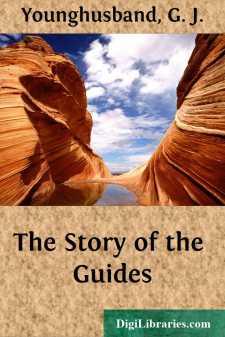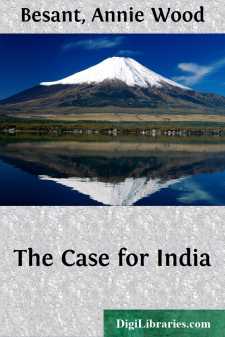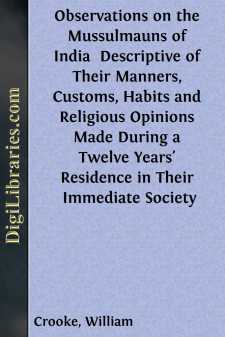History
- Africa 30
- Americas (North Central South West Indies) 50
- Ancient 68
- Asia
- Australia & New Zealand 8
- Canada 41
- Caribbean & West Indies 1
- Civilization 20
- Eastern Europe 12
- Europe 310
- Expeditions & Discoveries 60
- General 77
- Historical Geography 1
- Jewish 9
- Latin America 3
- Medieval 8
- Middle East 13
- Military 248
- Revolutionary 8
- Study & Teaching 5
- United States 353
- Western Europe 56
- World 13
Asia Books
Sort by:
by:
Emma Helen Blair
Preface The scope of the present volume is confined to the year 1636, but enough of interest occurs within that time—thanks to the overflowing energy of the new governor, Corcuera, who promptly reorganizes all departments of the government; his controversies with the archbishop and the friars; and the difficulties and dissensions which affect the orders themselves. The greater part of this volume is...
more...
by:
Emma Helen Blair
Ecclesiastical Affairs of the Philippines Royal Instructions to Gomez Perez Dasmariñas Regarding Ecclesiastical Affairs The King. To Gomez Perez Dasmariñas, my governor and captain-general of the Philipinas Islands, or the person or persons in charge of their government: I ordered a decree of various articles to be given to my viceroy of Nueva España, in regard to what was to be done and observed in...
more...
by:
Emma Helen Blair
Chapter XXX Of the first election of our father Fray Lorenzo de León With the fourth of May, 1596, all the capitular religious of this province of SantÐÑsimo Nombre de Jesús of Filipinas assembled, and without much debate cast their votes for father Fray Lorenzo de León,a native of the city of Granada, and son of the house at Méjico, whose learning, ability to preach, and other good...
more...
CHAPTER I FIRST STEPS IN WAR It is given to some regiments to spread their achievements over the quiet centuries, while to the lot of others it falls to live, for a generation or two, in an atmosphere of warlike strife and ever present danger. The Guides have been, from a soldier's point of view, somewhat fortunate in seeing much service during the past sixty years; and thus their history lends...
more...
by:
Emma Helen Blair
PREFACE The general documents contained in this volume cover the years 1601-03; they are followed by Chirino's Relacion, which was published in 1604, but the events related therein end in 1602. The two notable occurrences in this period are the great fire, and the Chinese revolt in Manila in the year 1603—the latter ending in the slaughter or expulsion of almost all the Chinese in the islands....
more...
CHAPTER I. PRE-WAR MILITARY EXPENDITURE. The Great War, into the whirlpool of which Nation after Nation has been drawn, has entered on its fourth year. The rigid censorship which has been established makes it impossible for any outside the circle of Governments to forecast its duration, but to me, speaking for a moment not as a politician but as a student of spiritual laws, to me its end is sure. For...
more...
by:
William Crooke
INTRODUCTION Very little is known about the authoress of this interesting book. She is reticent about the affairs of her husband and of herself, and inquiries recently made at Lucknow, at the India Office, and in other likely quarters in England, have added little to the scanty information we possess about her. The family of her husband claimed to be of Sayyid origin, that is to say, to be descended...
more...
by:
Emma Helen Blair
Preface The present volume covers the period of 1583 to 1588 inclusive. At the close of two decades of Spanish occupation in the Philippines, the native population is decimated, and the Spanish colonists are poor, heavily burdened with taxation, and largely non-producing. The islands are but nominally defended by a small, irregular, demoralized force of unpaid soldiers, whose lawlessness and arrogance...
more...
by:
Robert Knox
CHAP. I. How this Island lyes with respect unto me Neighbouring Countries, I shall not speak at all, that being to be seen in our ordinary Sea-Cards, which describe those Parts; and but little concerning the Maritime parts of it, now under the Jurisdiction of the Dutch: my design being to relate such things onely that are new and unknown unto these Europæan Nations. It is the Inland Countrey therefore...
more...
by:
Emma Helen Blair
RELATION OF THE FILIPINAS ISLANDS And of What Has There Been Accomplished by the Fathers of the Society of Jesus How Father Francisco de Vera returned to España for more fathers. Chapter XXXVII. The men of the Society remained in the rest of those Pintados Islands, occupied as we have already seen. In various places, during those two years, there had been newly erected to the glory of Jesus Christ...
more...











